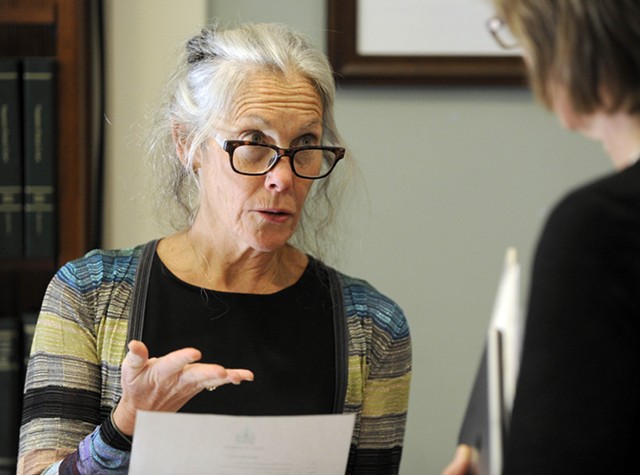
- Jeb Wallace-Brodeur
- Rep. Maxine Grad, chair of the House Judiciary Committee, which voted out a privacy protection bill addressing the use of drones and license-plate readers.
The House Judiciary Committee walked a tightrope Thursday in recommending its version of a bill to protect personal privacy.
The legislation sets guidelines for how and when the police may use drones, and it reauthorizes police use of cameras that capture photos of license plates and establishes the procedures that law enforcement agencies must follow to gain access to electronic communications.
“What is important is the balance between protecting individual privacy and enhancing public safety,” said Rep. Maxine Grad (D-Moretown), chair of the committee.
The tension between privacy and public safety was apparent as the committee discussed a provision that would ban police from using a drone “to gather or retain data on private citizens peacefully exercising their constitutional rights of free speech and assembly.”
“There is going to be a hue and cry if law enforcement starts flying these things over peaceful assemblies,” said Rep. Willem Jewett (D-Ripton).
“We are living in a different age of safety,” countered Rep. Vicki Strong (R-Albany). “I don’t want to tie [law enforcement’s] hands too much.”
Committee members debated whether police should be able to observe an event with a drone for public safety purposes, but not be allowed to keep the recording, or whether police should be banned from even flying the aircraft over a crowd.
Rep. Gary Viens (R-Newport) wondered, for example, whether police could fly drones over the Burlington marathon, reminding his colleagues about the bombing that took place at the Boston Marathon. “I don’t want to take away that potential tool to avert a potential disaster,” he said.
Beth Novotny, representing the Vermont Police Association, argued that the drone provision in the draft before the committee allowed no exceptions to the ban on flying drones over peaceful assemblies. She warned: “There would be no public safety operation allowed.”
Jewett disagreed with her interpretation, but committee members agreed that they wanted to allow drone flyovers “for observational, public safety purposes that do not involve gathering or retaining data” or after police obtained a warrant. Those provisions became part of the final version.
The committee also wrestled with possible changes to the rules covering the use of license-plate readers. The current law governing them expires on July 1.
The American Civil Liberties Union of Vermont had lobbied lawmakers to shrink the length of time police could keep data from the readers from the current 18 months to 24 hours. The Senate, which passed the privacy bill in January, stuck with 18 months, and so did the House.
The Senate bill would permanently legalize license-plate readers. The House proposes another expiration date in three years. Grad said that with emerging technologies, “It is important to be cautious and continue to monitor.”
The committee voted 9-2 to recommend its version of the bill.
“Everybody got something, and everybody lost something,” Rep. Tom Burditt (R-West Rutland) said of the final version of the bill. “I almost look at it as the barometer of a good bill.”
Allen Gilbert, executive director of the ACLU of Vermont cheered that lawmakers in both chambers recognized the need to enact more privacy protections, even though the bill fell short of what he wanted.
“This is tough stuff,” he said. “These committees are trying to deal with challenging new technology and how it affects personal privacy.”
The full House will debate the bill Monday. The House and Senate will likely have to negotiate the final version of the bill in the few remaining days of the legislative session.







![International Drone Day [SIV442]](https://media1.sevendaysvt.com/sevendaysvt/imager/u/mobileteasertall/3349617/episode442.jpg)




Comments
Comments are closed.
From 2014-2020, Seven Days allowed readers to comment on all stories posted on our website. While we've appreciated the suggestions and insights, right now Seven Days is prioritizing our core mission — producing high-quality, responsible local journalism — over moderating online debates between readers.
To criticize, correct or praise our reporting, please send us a letter to the editor or send us a tip. We’ll check it out and report the results.
Online comments may return when we have better tech tools for managing them. Thanks for reading.